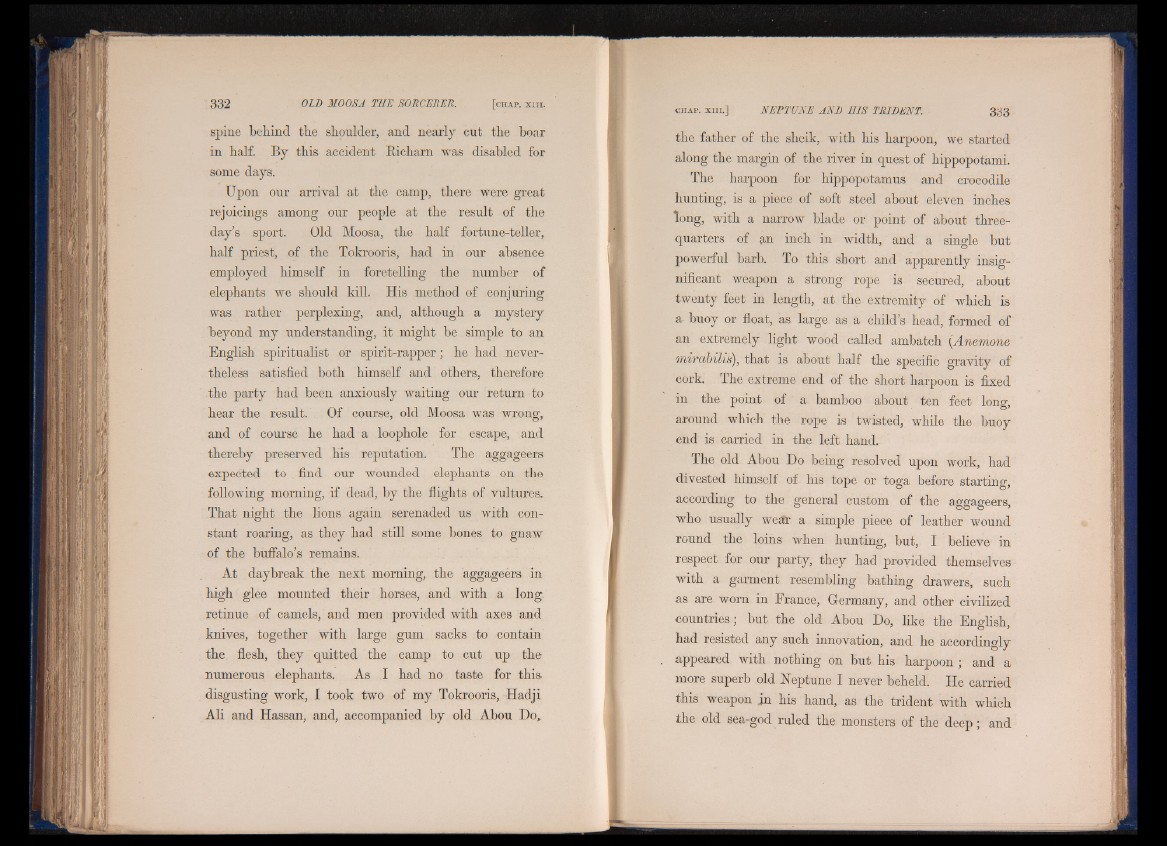
spine behind the shoulder, and nearly cut the boar
in half. By this accident Richarn was disabled for
some days.
Upon our arrival at the camp, there were great
rejoicings among our people at the result of the
day’s sport. Old Moosa, the half fortune-teller,
half priest, of the Tokrooris, had in our absence
employed himself in foretelling the number of
elephants we should kill. His method of conjuring
was rather perplexing, and, although a mystery
beyond my understanding, it might be simple to an
English spiritualist or spirit-rapper; he had nevertheless
satisfied both himself and others, therefore
the party had been anxiously waiting our return to
hear the result. Of course, old Moosa was wrong,
and of course he had a loophole for escape, and
thereby preserved his reputation. The aggageers
expected to find our wounded elephants on the
following morning, if dead, by the flights of vultures.
That night the lions again serenaded us with constant
roaring, as they had still some bones to gnaw
of the buffalo’s remains.
At daybreak the next morning, the aggageers in
high glee mounted their horses, and with a long.
retinue of camels, and men provided with axes and
knives, together with large gum sacks to contain
the flesh, they quitted the camp to cut up the
numerous elephants. As I had no taste for this
disgusting work, I took two of my Tokrooris, Hadji
Ali and Hassan, and, accompanied by old Abou Do,
the father of the sheik, with his harpoon, we started
along the margin of the river in quest of hippopotami.
The harpoon for hippopotamus and crocodile
hunting, is a piece of soft steel about eleven inches
long, with a narrow blade or point of about three-
quarters of an inch in width, and a single but
powerful barb. To this short and apparently insignificant
weapon a strong rope is secured, about
twenty feet in length, at the extremity of which is
a- buoy or float, as large as a child’s head, formed of
an extremely light wood called ambatch (Anemone
mirabilis), that is about half the specific gravity of
cork. The extreme end of the short harpoon is fixed
in the point of a bamboo about ten feet long,
around which the rope is twisted, while the buoy
end is carried in the left hand.
The old Abou Do being resolved upon work, had
divested himself of his tope or toga before starting,
according to the general custom of the aggageers,
who usually we£r a simple piece of leather wound
round the loins when hunting, but, I believe in
respect for our party, they had provided themselves
with a garment resembling bathing drawers, such
as are worn in France, Germany, and other civilized
countries; but the old Abou Do, like the English,
had resisted any such innovation, and he accordingly
appeared with nothing on but his harpoon ; and a
more superb old Neptune I never beheld. He carried
this weapon in his hand, as the trident with which
the old sea-god ruled the monsters of the deep; and